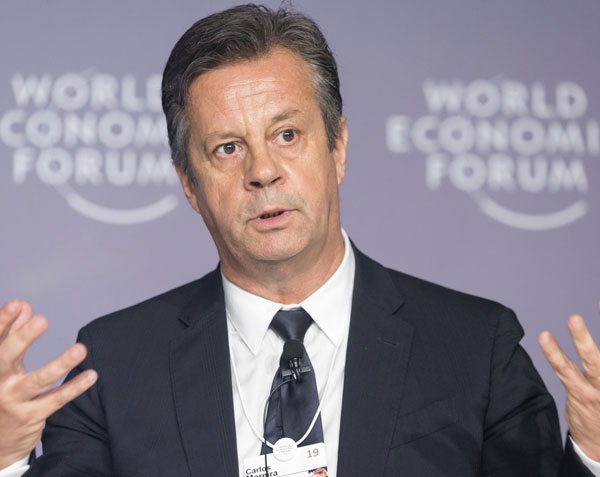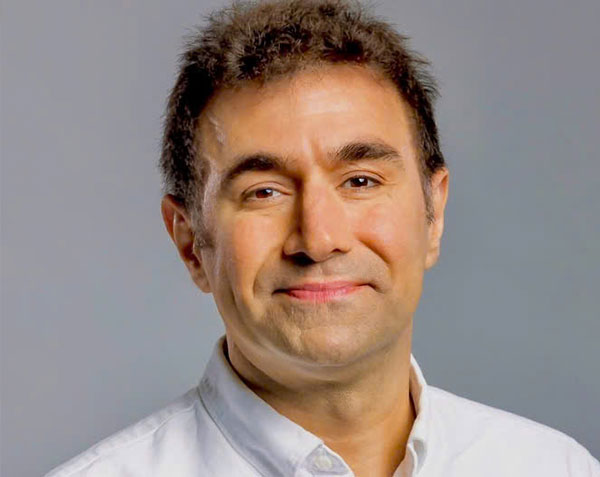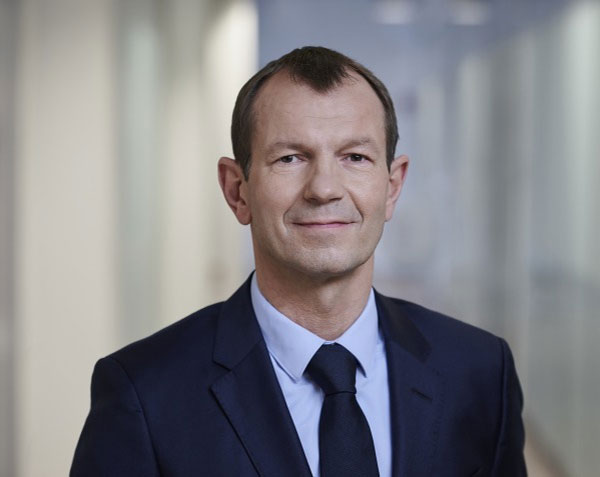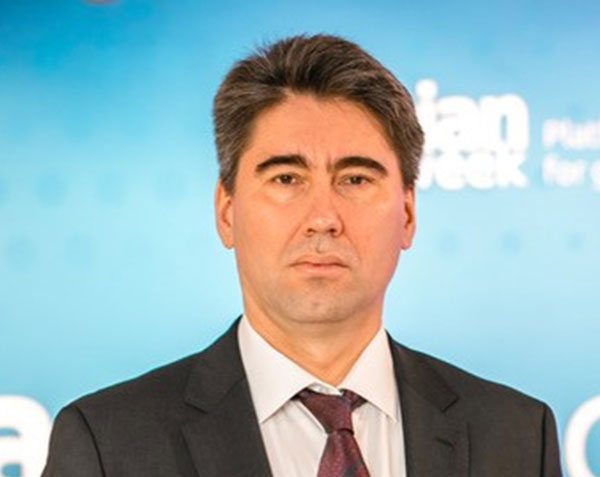How Space Will Be the Next Internet

Space as the New Frontier for Digital Infrastructure:
Join Our WISeKey Davos Space Roundtable
This panel will explore the potential of space as the next digital frontier, delving into the opportunities and obstacles that lie ahead. We will discuss how satellite constellations like WISeSat can transform global connectivity, the vital role of space in environmental monitoring, and the critical security and political questions to address. With insights from experts in technology, policy, and defense, this webinar will chart the course for the future of space-based digital infrastructure.
Join us to discover how space is not just the final frontier but the next frontier in digital evolution.
Space is rapidly emerging as the next frontier for digital infrastructure, with satellite constellations leading the charge toward a space-based internet. This transformation is poised to redefine global connectivity, communication, and data sharing. As we look to the stars for the next wave of technological advancement, the opportunities for innovation and expansion seem limitless. However, this bold shift brings forth an array of challenges, from security and ethical concerns to political and technological integration hurdles.
The Emergence of a Space-Based Internet
Satellite constellations, particularly those in Low Earth Orbit (LEO), are at the core of next-generation internet infrastructure. Unlike traditional geostationary satellites, which orbit farther from Earth with limited coverage, LEO satellites are positioned closer, enabling faster, more reliable, and widespread connectivity. Major initiatives like SpaceX’s Starlink and Amazon’s Project Kuiper are building extensive LEO networks to provide high-speed internet access to the world’s most remote areas.
This space-based internet holds the potential to close the global digital divide, delivering connectivity to underserved and disconnected regions. From connecting rural communities to supporting communication systems on ships, planes, and in disaster zones, space-based internet promises to democratize access on an unprecedented scale.
Opportunities for Global Connectivity and Beyond
The potential benefits extend beyond connecting people. With satellite IoT (Internet of Things) technology becoming more accessible, the opportunities for global connectivity grow rapidly. Imagine billions of IoT devices, from smart cities to agricultural sensors, seamlessly communicating via satellites, unhindered by terrestrial infrastructure. This could revolutionize industries by enhancing logistics, environmental monitoring, agricultural optimization, and disaster resilience.
LEO satellites, in particular, have proven transformative in environmental monitoring. By enabling accurate data collection from virtually any location on Earth, they support responses to complex environmental challenges like climate change, deforestation, and resource management. With real-time space data, governments and organizations can make informed decisions and act quickly to address these issues.
How Armies are Using Space with WISeSat Low Orbit Satellites
As space infrastructure evolves, military forces around the world are also leveraging LEO satellite technology for enhanced situational awareness, secure communications, and real-time data capabilities. WISeSat Low Orbit Satellites are playing a crucial role here, providing a highly secure platform for military applications and enabling connectivity in regions that lack traditional infrastructure. Armies are deploying these satellites to gain instant access to critical intelligence and perform real-time monitoring of areas of strategic interest, particularly in isolated or conflict-prone zones. The secure and resilient architecture of WISeSat supports encrypted communications and data transmission, making it an essential asset for military operations requiring robust, fail-safe information channels.
This military usage of WISeSat technology emphasizes not only the adaptability of LEO satellites but also the critical role of cybersecurity in safeguarding communications in sensitive environments. With a growing dependency on space-based resources, maintaining these channels against potential cyber threats is a top priority. As a result, WISeSat’s low orbit solutions are crafted with advanced cryptographic measures to protect against interference, cyber-attacks, and unauthorized access, ensuring that militaries can operate with confidence in secure and reliable communications.
Challenges to Overcome: Security, Politics, and Cost
Despite the vast potential, the road to a fully realized space-based internet is not without obstacles. One significant challenge is ensuring security; with satellite networks managing critical communications and IoT systems, space becomes a prime target for cyberattacks. Ensuring the integrity of space-based communications is paramount, as disruptions could have global ramifications, affecting everything from financial systems to emergency services.
Ethical implications also arise as space becomes a digital frontier. Who governs the space internet? What happens if satellite debris becomes a threat, or if access is restricted for political or economic reasons? International cooperation and governance will be crucial to prevent conflicts and ensure that space remains accessible and beneficial to all.
Cost remains another barrier to widespread adoption, as deploying satellites, developing modules, and transmitting data are still expensive undertakings. Political challenges, such as spectrum allocation and regulatory approvals, add layers of complexity that need to be addressed for a truly interconnected global infrastructure.
The Role of LEO Satellites in Environmental Monitoring
LEO satellites have proven invaluable for environmental monitoring, providing precise data on climate change, deforestation, pollution, and more. These satellites enable experts to obtain information from even the most remote locations, providing a perspective that terrestrial systems cannot match. As environmental challenges become more urgent, the role of LEO satellites in monitoring and responding to these issues will continue to grow.
A New Era for Global Infrastructure
The transition to a space-based internet marks a critical shift in global digital infrastructure. As more organizations and governments invest in satellite technology, the dream of a fully connected world inches closer to reality. Achieving this vision, however, requires navigating a complex landscape of security risks, ethical considerations, political challenges, and technological advancements.
Our speakers

Carlos Creus Moreira
Founder, Chairman and CEO at WiseKey

Carlos Moreira began his career as a UN expert on IT, eSecurity and Trust Models, working for ILO, UN, UNCTAD, ITC/WTO, World Bank, UNDP, ESCAP from 1983 to 1998. A recognized early stage pioneer in the field of digital identity, he was also Adjunct Professor of the Graduate School of Engineering Royal Melbourne Institute of Technology from 1995 to 1999 as well as Head of the Trade Efficiency Lab at the Graduate School of Engineering at RMIT.
In 1999, he founded the Geneva-based online data security firm WISeKey, where he currently serves as Chairman and CEO. Mr Moreira’s unique profile, which combines extensive high level international diplomacy experience and emerging technologies expertise, has positioned him as a distinctive authority, thought leader, and entrepreneurial force in today’s digital world where the acquisition and trusted protection of a digital identity has become an essential step for citizens and entities across the globe. He is a Member of the UN Global Compact, Member of the World Economic Forum’s Global Agenda Council, Founding Member World Economic Forum Global Growth Companies.
Topic: "Securing the Future with Exponential Technologies"
Carlos will focus on the growing importance of cybersecurity in the era of exponential technologies, highlighting how blockchain, IoT, and AI are transforming security landscapes. He will explore how WISeKey's innovations, including post-quantum cryptography, are safeguarding AI and critical infrastructures globally.

Ashok Ranadive
CEO & Co-Founder CarbonMinus Entrepreneur & Investor

Ashok is Director of Professional Services at CasperLabs, where he leads enterprise engagements and strategic partnerships. Prior to joining CasperLabs, Ashok spent 12 years with Google Inc., in their India, Singapore, and Mountain View offices, where he led teams managing large programs and professional services for large clients. Before Google, Ashok served for 20 years with the Indian Navy and retired as a Commander. He was primarily involved in the design, development, and construction of India’s first unconventional submarine. He has a Post Graduate in Nuclear Engineering and also has a business degree.
Topic: "Sustainable Innovation: The Intersection of Technology and Climate Action"
Ashok will speak on the critical role that technology, including AI and blockchain, plays in combating climate change. His session will highlight how companies can leverage exponential technologies to reduce carbon footprints and create a more sustainable future.

David Shrier
CEO & Co-Founder Esme Learning Solutions

David Shrier is a globally recognized futurist and technology innovator. He leads Esme Learning, an AI-enabled workforce transformation company partnered with MIT, Oxford, Cambridge, and Imperial College that is upskilling the economies of tomorrow. An educational innovator, David was responsible for launching the four most profitable online classes in history for MIT and Oxford, in the process creating a new $1 billion category.
David specializes in helping established organizations build innovative capacity, having developed $10 billion of growth opportunities with companies including Dun & Bradstreet, Ernst & Young, GE, Wolters Kluwer, The Walt Disney Company, UBS, Kyriba, Peoples Group, AOL Verizon, and Starwood, as well as leading private equity and VC funds. He currently holds board and C-level roles with multiple privately-funded technology companies.
David also has a distinguished academic career. David is a Professor of Practice (Artificial Intelligence and Innovation) with Imperial College Business School, Imperial College London. He previously was an Associate Fellow with the Said Business School, University of Oxford, and a Lecturer & Futurist at the Massachusetts Institute of Technology.
His government and nonprofit advisory portfolio includes supporting the European Parliament‘s new artificial intelligence legislative efforts and serving on FINRA’s fintech committee. He was principal author and lead consultant on the Commonwealth Fintech Toolkit, helping 53 countries understand how to shape web3 and fintech policy.
David’s published books include Global Fintech (2022, MIT Press), Augmenting Your Career: How to Win at Work in the Age of AI (Little, Brown 2021), Basic Blockchain (Little, Brown 2020), Trusted Data (MIT Press, 2019), Frontiers of Financial Technology, New Solutions in Cybersecurity (MIT Press, 2018), and Trust Data. David Shrier was granted an Sc.B. from Brown University in Biology and Theatre.
Topic: "The Future of Learning: How AI is Revolutionizing Education"
David will dive into how AI and immersive technologies are reshaping education, making learning more personalized and accessible. He will also discuss the evolving role of digital transformation in higher education and professional development.

Hossein Rahnama
Founder and CEO, Flybits Inc. Associate Professor, Ryerson University. Visiting Professor, MIT Media Lab

Hossein Rahnama is a Professor at the MIT Media Lab and Toronto Metropolitan University. He is also the Founder and CEO of Flybits, an Ai/ Data Science company. His research is focused on the design of Human-AI Systems , data governance for generative Ai and the future of Human-Computer Interaction. He has published more than 40 papers and holds 16 patents in computer and data science. He previously served as a council member at NSERC (National Science and Research Engineering Council of Canada) and is currently on the board of directors of Home Capital Group, Canadian Science Publishing and Havergal College. He is a founding fellow at the MIT Connection Science and one of the Global Directors of MIT Media Lab’s City Science Group. He has been on MIT Technology Review Global TR35 list (2012) and Canada's Top 40 under 40 (2017).
Topic: "The Power of Context: Harnessing AI for Personalization"
Hossein will address how AI is being used to deliver personalized, context-aware experiences in sectors like smart cities, finance, and mobility. He will explore how AI can enhance customer engagement by delivering more relevant, real-time services.

André Wall
CEO Gruppe bei RUAG International & Beyond Gravity

Senior executive and visionary leader with 25+ years in the Aviation industry (Airline, MRO, Business Aviation, OEM). Added 3+ years in Formula 1 High speed technology and the Toyota Production System SENSEI Level. Proven track record in transformation and value delivery on commitments. Enjoy to make money and numbers ie 20x profit in less than 4years. ROIC 45+% through leadership by example and with integrity. Proud to have demonstrated the ability to transform and deliver 35+% speed and efficiency increase. Innovative and Creative in approach for turnarounds. Passionate about energizing people in order to get things done with reason, analysis, but fast, successful and with fun. Committed and innovative with the aim to create value and a sustainable future. Enjoy to develop future generation and leaders.

Yann Donon
Director of Telecommunications at RUAG and a political advisor specializing in emerging technologies and space

With a Doctorate in Mathematics and IT, Yann’s career spans international corporations, NGOs, startups, and military sectors. At RUAG, he leads pioneering efforts in space-based telecommunications, advancing Switzerland's position in the future of mission-critical communications.

Didier Manzoni
Deputy CEO, General Manager Space at APCO Technologies, President of the Swiss Space Industry Group

As General Manager Space at APCO Technologies, one of the largest independent European suppliers of space equipment, Didier Manzoni is responsible for the development of satellite and launcher systems and oversees the company’s operational activities at the Guiana Space Centre. Didier is also the President of the Swiss Space Industry Group.
Since 1988, he has participated in all the major missions of the European Space Agency and holds a Master’s degree in Aeronautics and Space from the Institut Supérieur de l’Aéronautique et de l’Espace.

Murat Seitnepesov
Chairman of the Organizing Committee, Caspian Week Forum; Chairman of the Board, Integral Group

For a brief period while receiving his University education, Murat Seitnepesov engaged in scientific studies as a Research Fellow in the Institute of Nuclear Physics of the Siberian Branch of the Academy of Sciences of Russia. Upon completing his University degree, Murat pursued a career in banking as the Leading Specialist in the Central Bank of Turkmenistan and then Head of International Operations Division in the State Agricultural Bank of Turkmenistan. After that, he fully immersed himself in the areas of trading and logistics – first as an Area Manager and Board Member for Golden Bridge Ent. Inc. in UAE, then as Managing Director of Militzer & Muench Turkmenistan Ltd and Chairman of the Board of Emex Turkmenistan Ltd.
With ten years of hands-on and comprehensive experience in trading and logistics, Murat Seitnepesov moved his business operations to Geneva, Switzerland where he founded Integral Petroleum SA, company dedicated for development of the oil and petroleum products exports and logistics from the Caspian Region. For the next 12 years he has successfully developed his business into a Group of Companies which established itself as a reliable and socially responsible regional and global player.
